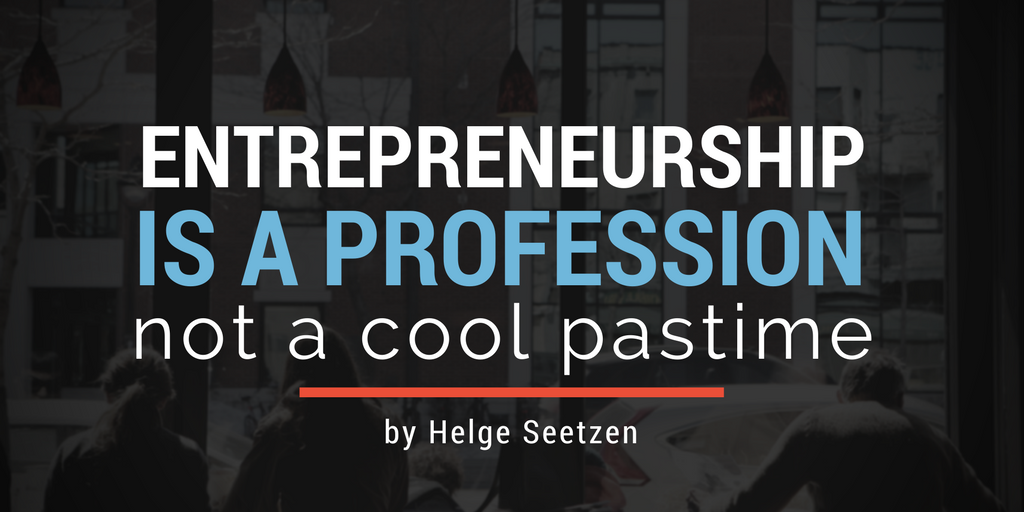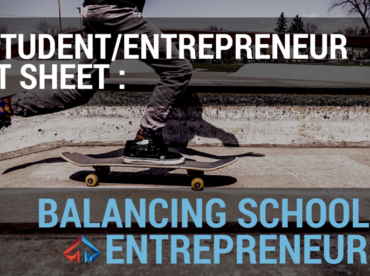While traveling in the Valley I had a chance to catch up with a few local entrepreneurs and accelerators. Many of them are doing interesting work, but I noticed a disturbing trend: entrepreneurship has become “cool” for a whole generation.
As a an entrepreneur who had gone through several popular accelerators told me, “It used to be that if you didn’t know what to do at the end of college you would go to grad school. Now the same people go to accelerators instead.” And they bring with them their culture: beer games, lawn chairs, geek gadgets, and “bro culture” galore. Everybody is a ‘rebel,’ but in exactly the same way.
As much as I applaud entrepreneurial energy, I believe that this trend is a bad news for society in general. Entrepreneurship is risky business, requiring highly skilled, disciplined and motivated people. Encouraging entrepreneurship among individuals who lack any of these three characteristics is setting them up for failure, and setting society up for a big bill in the future.
The parallels to graduate school are strong. While I am a strong advocate of graduate studies, I also spent much of grad school surrounded by people without clear goals or motivation. Putting the same crowd into startups achieves nothing. If you lack the drive, self-control and people skills to finish a PhD in 3-4 years, then you likely won’t be building strong businesses either. These “Peter Pan” grad students won’t drive the economy even if they become trendy entrepreneurs (or whatever the next cool thing might be).
Instead, society pays for their leisure. This is obvious for grad students, because educational subsidies are fairly visible in our economy. For trendy entrepreneurs, government new business grants can play the same role, but the real economic cost is less visible. My parents produced economic value from the age of 17, contributing to social security and their own retirement savings. Whether unfocused grad school or unfocused entrepreneurship, we are creating a generation that delays this kind of societal contribution for years, decades or even forever – burdening the rest of society with their bills.
I am a strong believer in progressive taxation. The wealthy should pay more than their fair share because society has a moral obligation to fight poverty and support those unable to improve their lives for reasons of intellectual, social or physical hardship. But this kind of system is weakened when capable individuals delay their social contribution indefinitely. “Lifestyle poor” students and entrepreneurs are not in the same camp as those with true hardship. Their lack of economic productivity is due to personal choice, a lack of discipline, or unrealistic expectations. They are potential net contributors to society who decide to become net beneficiaries instead – robbing the truly disadvantaged twice, by first reducing the available resources, and then competing for the smaller resource pool [1]. This hurts our collective future.
Both entrepreneurship and graduate studies should be goal oriented, execution focused, and make a net contribution to the world. Entrepreneurship, like graduate studies, isn’t about wearing a hoodie, speaking at conferences, following people on Twitter, or reading the latest buzzword ebook. It’s not even about building a great website or product. Entrepreneurship is about building a scalable business with people, products and meaningful financials.
That requires pretty specific skills and beyond average discipline that not a lot of people possess[2]. Given that you either succeed as an entrepreneur or you don’t, it is irresponsible to perpetuate the myth that everybody can be an entrepreneur (or should be). It is as amoral as encouraging lottery participation in poorer neighbourhoods, or home ownership for those without sufficient income. Somebody will make money, but it won’t be the ill-suited entrepreneurs, and it won’t be society as a whole.
[1] This is not an issue of personal financial balance. It doesn’t matter whether you have a lifestyle that “works” with $10k a year or not. Unless you live on the moon, society *does* subsidize your lifestyle whenever you earn less than the average income level for your age group (government debt and the degree of progressive taxation in your country modify that bar a bit but it is a good first-order approximation). You don’t get the subsidy cheque but it flows into everything from the streets that you walk on, the food that you consume, the energy that you consume and so forth.
[2] The tough part is finding out whether you are one of the few people who can build businesses instead of working in one. There are no ultimate rules for this but a good indicator is whether you have the discipline to consistently succeed in non-entrepreneurial activities that your peers have difficulty with (e.g. making your marriage work when 50% of them fail, getting through college without debt when 80%+ of students have debt, etc.).



